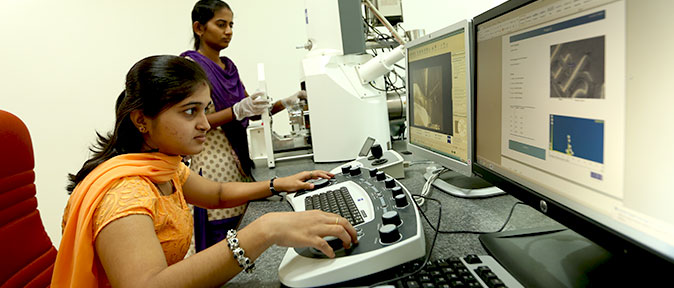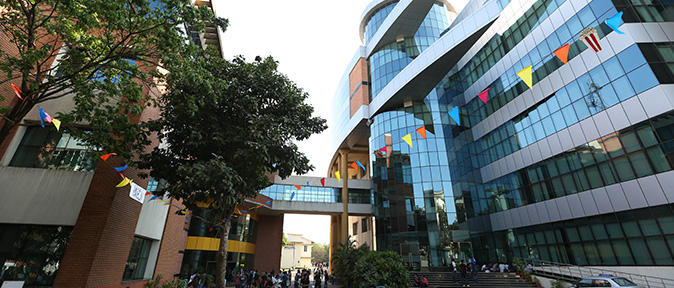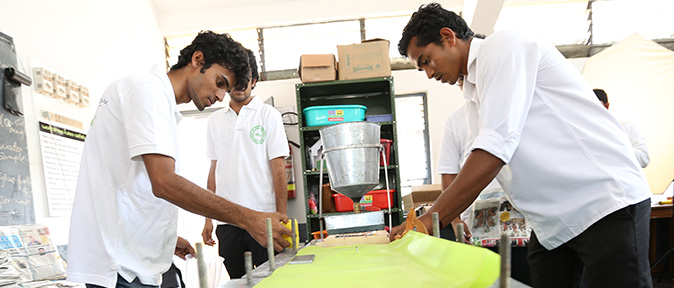Biomedical Engineering - Overview
Minor Specializations
The BTech program in Biomedical Engineering offers minor specializations in
- Biomaterials
- Signal & Image Processing
- Material Science
- Business Management
- Computational Mathematics
The Bachelor of Technology Biomedical program at MIT has the following benefits.
- Several new courses and laboratories have been introduced over the past 5 years to pull the program close to international standards. Examples include the introduction of new courses such as Object-Oriented Programming, Microcontrollers, Embedded Systems, Tissue Engineering, and Signal and Image Processing Laboratory in MATLAB.
- A separate laboratory facility has been for research and development.
- Well-equipped laboratories: Instrumentation lab, Electronics lab, Computing Lab, Research lab (which includes the Physiological Signal Acquisition Lab, and Biomaterials and cell culture lab).
- The core subjects have practical sessions so that students can have hands-on experience.
- Industrial training as a part of the curriculum.
- The final semester project is a major opportunity for the student to utilize the subject knowledge accumulated during the course, learn to work independently, involve in R & D activity, and innovate.
Some of the major companies that have hired students from the department include Baxter, Siemens Helathineers, Medtronics, Infosys, Cerner Healthcare, Wipro Biomed, GE Healthcare, Accenture, Deloitte, Teachnook, Boston Consulting, Verzeo, Lead Squared
Biomedical Engineering Programme Educational Objectives (PEOs)
- Develop the ability to work in a multidisciplinary environment involving Engineering and health care – by acquiring knowledge in Basic Sciences & Mathematics, Engineering, and Medical Sciences.
- Ability to analyze real-life problems, and design healthcare solutions that are technically sound, economical, and socially acceptable.
- Demonstrate professionalism, ethical attitude, communication skills, ability to work in teams, and adapt to changing trends by engaging in lifelong learning.
Biomedical Engineering Programme Outcome (POs)
- PO1: Engineering Knowledge - Apply the knowledge of mathematics, science, engineering fundamentals, and an engineering specialization to the solution of complex engineering problems.
- PO2: Problem analysis - Identify, formulate, research literature, and analyse complex engineering problems reaching sustained conclusions using first principles of mathematics, natural sciences, and engineering sciences.
- PO3: Design/Development of Solutions - Design solutions for complex engineering problems and design system components or processes that meet the specified needs with appropriate considerations for the public health and safety, and the cultural, societal, and the environmental considerations.
- PO4: Conduct investigations of complex problems - Use research-based knowledge and research methods including design of experiments, analysis and interpretation of data, and synthesis of the information to provide valid conclusions.
- PO5: Modern tool usage - Create, select, and apply appropriate techniques, resources, and modern engineering and IT tools including prediction and modelling complex engineering activities with an understanding of the limitations.
- PO6: The engineer and society - Apply reasoning informed by the contextual knowledge to assess societal, health, safety, legal, and cultural issues and the consequent responsibilities relevant to the professional engineering practice.
- PO7: Environment and sustainability - Understand the impact of professional engineering solutions in societal and environmental contexts, and demonstrate the knowledge of, and need for sustainable development.
- PO8: Ethics - Apply ethical principles and commit to professional ethics and responsibilities and norms of the engineering practice.
- PO9: Individual and team work - Function effectively as an individual, and as a member or leader in diverse teams, and in multidisciplinary settings.
- PO10: Communication - Communicate effectively on complex engineering activities with the engineering community and with the society at large, such as being able to comprehend and write effective reports and design documentation, make effective presentations, and give and receive clear instructions.
- PO11: Project management and finance - Demonstrate knowledge and understanding of the engineering and management principles and apply them to one’s own work, as a member and leader in a team, to manage projects and in multidisciplinary environments.
- PO12: Life-long learning - Recognize the need for and have the preparation and ability to engage in independent and life-long learning in the broadest context of technological change.
Biomedical Engineering Programme Specific Outcomes (PSO)
- PSO1: Acquire essential knowledge of medical sciences, in addition to in-depth knowledge and skills in engineering sciences.
- PSO2: Develop the ability to record, make measurements, analyse and interpret data in medicine and life sciences.
- PSO3: Apply the knowledge and skills in a multidisciplinary environment to develop diagnostic and therapeutic or assistive devices for better healthcare.
Outline - BTech Biomedical
BTech Biomedical course outline -(OLD)- May 2018
BME - Biomedical Engineering 2022 NEW Curriculum structure with Syllabus
Biomedical Engineering Course Duration
4 Years (8 semesters).
Key Dates & Deadlines
15
Mar 15 26
Mar ' 26
Last date to Apply
'
Tentative Course Commencement Date
Indian Students Apply
Manipal Academy of Higher Education not only caters to one’s academic needs, but also lays emphasis on all-round development of its students.
International Students Apply
Manipal Academy of Higher Education not only caters to one’s academic needs, but also lays emphasis on all-round development of its students.
Indian Students Apply
Manipal Academy of Higher Education not only caters to one’s academic needs, but also lays emphasis on all-round development of its students.
International Students Apply
Manipal Academy of Higher Education not only caters to one’s academic needs, but also lays emphasis on all-round development of its students.
Facilties

Laboratories
World-class laboratories give learning a practical dimension

Innovation Centre
State-of-the-art Innovation Centre to facilitate multi-disciplinary research

Libraries
Libraries have excellent resources for reference and study

MUTBI
Paper tree - A green initiative by MIT students of MUTBI

Computing Facility
Wi-fi campus with modern computing and digital facilities





